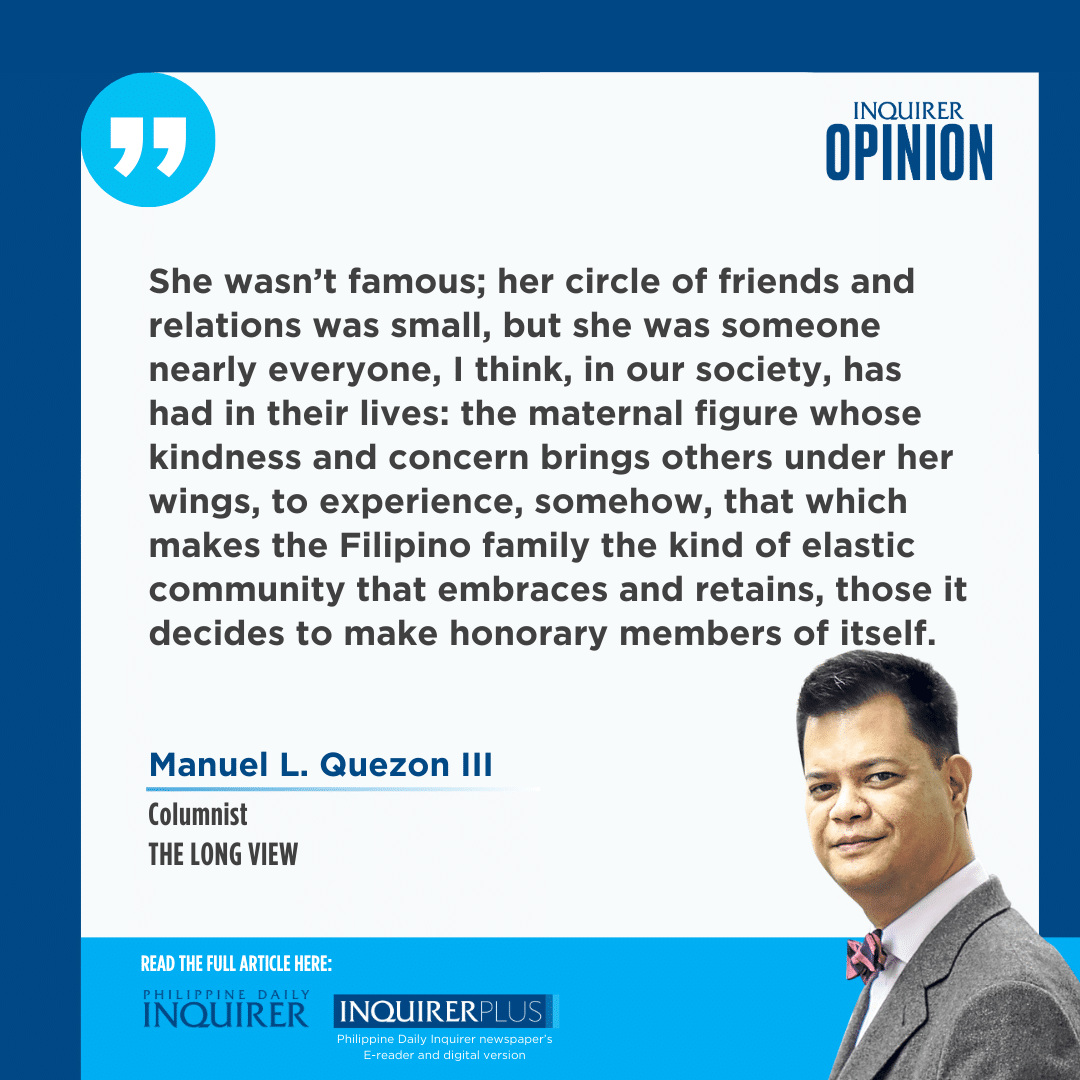‘Nanay’
That’s what we, the friends of her bunso, called her: and because that is what her son called her and how she treated all of us fortunate enough to be close to both of them, it is how we referred to her, too. And it’s how we received and told each other the news that, early in the morning of Oct. 24, in the midst of that awful typhoon, in the midst of a blackout and strong winds, Nanay had breathed her last.
This will be the first and last time you, the reader, will hear of her. She wasn’t famous; her circle of friends and relations was small, but she was someone nearly everyone, I think, in our society, has had in their lives: the maternal figure whose kindness and concern brings others under her wings, to experience, somehow, that which makes the Filipino family the kind of elastic community that embraces and retains, those it decides to make honorary members of itself.
Article continues after this advertisementShe’d been living in Cebu, cooking in their family restaurant, when along came Romeo, who was a boarder at their residence; his name was apt; romance blossomed; the two eloped; and on Feb. 6, 1965, they married and stayed together until Romeo passed away in 2018 after 53 years of marriage—not once, I once heard her say, did they have a quarrel (he also dutifully gave her his salary in full every month: a guarantee of domestic harmony and peace, my wife once said).
Their mutual devotion was reflected in the joys of parenthood: two sons and three daughters, and a secure, dignified life such as seems increasingly impossible to achieve today: he found fulfillment working in the United States Embassy and she brought up a brood who enjoyed their mother’s good cooking at home and the laughter of both parents. They bought their own home and in the fullness of time, their bunso enlarged and it expanded it for his parents to enjoy in their senior years.
As a couple, she and her husband weren’t immune to heartbreak. Twice, in fact, they’d had to endure the kind of loss every parent dreads: their eldest son, only 24 years old, suddenly died in 1996 and in 2010, they lost one daughter, a banker, to cancer. Then Nanay lost Tatay and was now alone, cared for by her bunso.
Article continues after this advertisementSeeing her in her times of loss—when she seemed beyond shedding any more tears after her daughter died, or when her home went silent after her husband passed away—I had to marvel at the faith and hope—and charity—that kept her going. It is said that women are emotionally, if not spiritually, stronger than men, with some attributing it to experiencing the agony of childbirth. All I know is that the example of women who have endured great loss, is an ennobling one.
Because Nanay never ceased to smile, to laugh, to enjoy what could be enjoyed without dwelling on the things that couldn’t. Charles de Gaulle famously observed that old age is a shipwreck; the older I get, the truer his words turn out to be. Nanay was no exception: the spirit was willing, but the flesh was weak; her knees would give way; doctors, medicines, procedures, and most of all, the list of what could never be, again, kept growing.
Her favorite phrase, in the last years of her life, was, “may misyon pa ako.” Her elder daughters were both abroad, one of them, a nurse, keeping in touch remotely to supervise Nanay’s medical care. But she had her son, they were in their own home, they grew even closer, and by the end, they had achieved what I believe is the closest thing to perfection any human can aspire to in this world or the next: having no regrets.
She could not walk, she could no longer cook; but, with the encouragement of her artist son, she took to coloring books which brought color into her sickroom and a respite from the worries of fragile health.
Leon Ma. Guerrero once recalled encountering Mrs. Aurora Quezon in the Malinta Tunnel in Corregidor early in 1942. He was about to return to the front in Bataan. “She smiled when I said goodbye and told me to pray that God should keep and bless us all. I was very deeply moved because I suddenly remembered my mother in Manila; it was just exactly what she would have told me and my mind gave a start of recognition, made a brief but tender identification between my mother and this pious lady quietly reading the life of a saint.”
I remembered Guerrero every time I encountered Nanay for similar reasons: her inquiry into my health, her smile if I shared good news and her putting her hand to her cheek if it was bad, was what one remembers and misses when one’s own mother has passed.
Thelma Durano Agoncillo Ambata, Aug. 21, 1937–Oct. 24, 2024.
—————-
Email: mlquezon3@gmail.com; Twitter: @mlq3

















